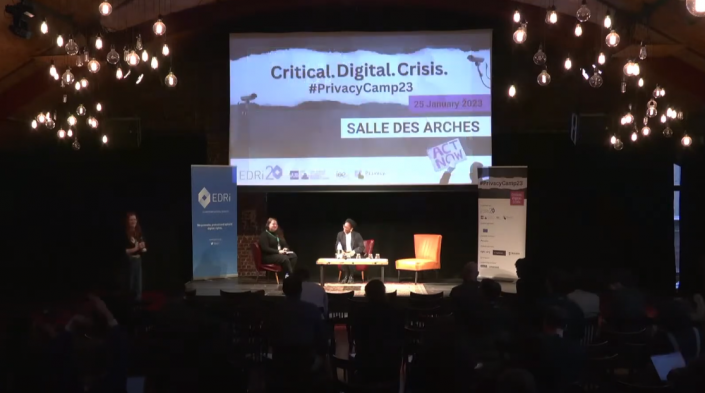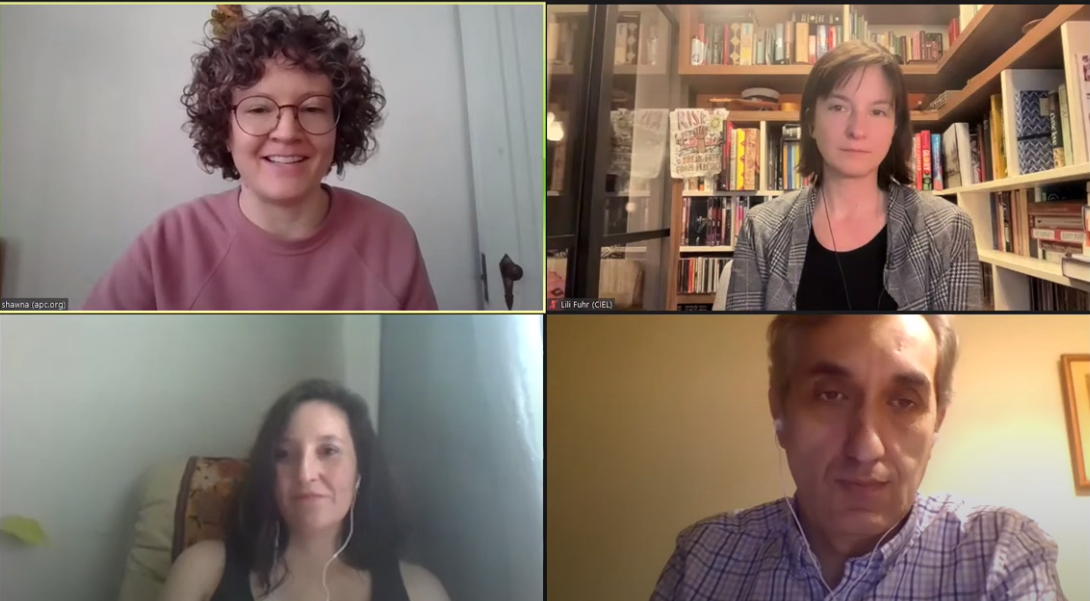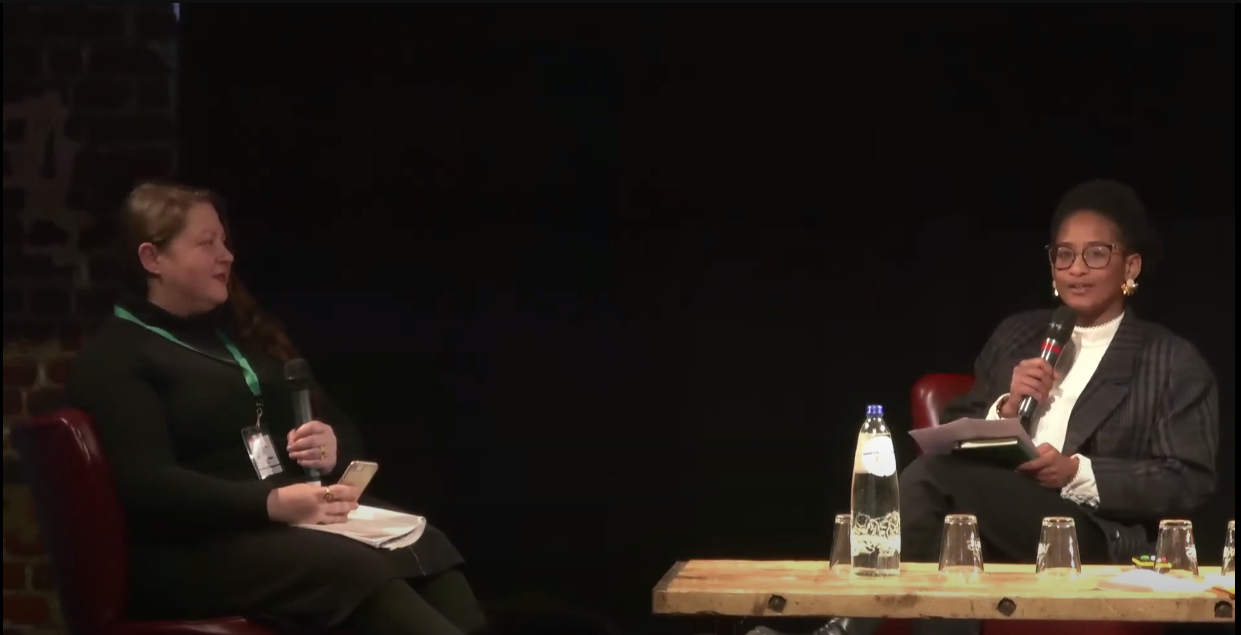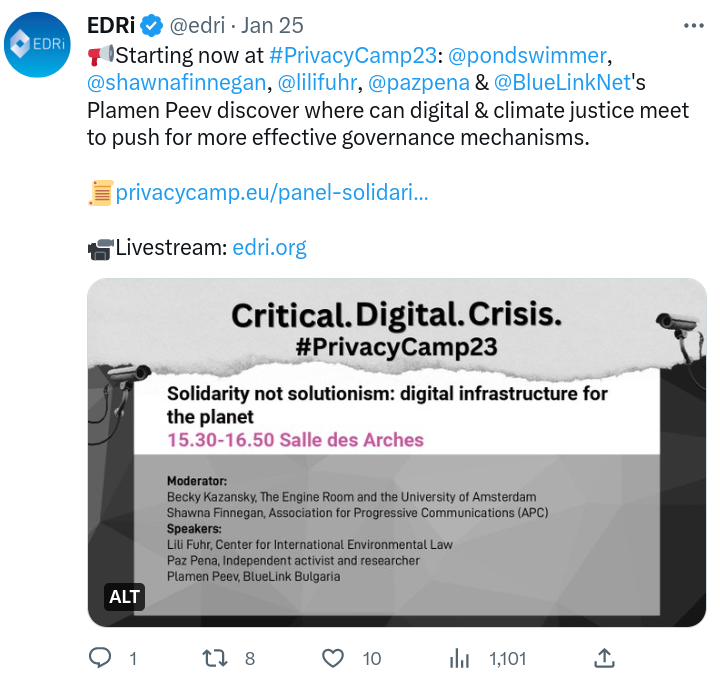
By Becky Kazansky (The Engine Room), shawna finnegan (APC) and Maja Romano (APC)
Published onPage last updated on
On 25 January, the European Digital Rights initiative (EDRi) hosted Privacy Camp 2023, which brought together digital rights advocates and technologists with a call to explore the critical infrastructure of digital technologies, and how they feed into and foster the multiple crises we inhabit.
We (Becky Kazansky, senior research consultant with The Engine Room, and shawna finnegan, Technology and Environmental Justice Initiative coordinator with the Association for Progressive Communications, APC) welcomed this opportunity to deepen and expand the conversation around digital rights, climate and environmental justice, and brought together a hybrid panel with Lili Fuhr, Paz Peña, Plamen Peev and Narmine Abou-Bakari, titled "Solidarity not solutionism: digital infrastructure for the planet".
The panel discussion provided space to reflect on some of the false climate solutions that digital rights advocates should be aware of amid efforts to act in solidarity with environmental defenders and climate justice movements. We invited participants in the session to reflect on shared demands for accountability across our struggles for digital rights, environmental protection and climate justice, and consider opportunities and mechanisms for collaboration.
Calling out false climate solutions and tech complicity
Our panel followed on research conducted last year by The Engine Room and APC, and a number of other collaborators, within a research consortium exploring the intersection of digital rights, climate and environmental justice.
The Engine Room's research highlighted the lack of transparency around the climate and environmental impacts of the tech sector, where bold pledges have been made in recent years with very little detail of actual progress made available to the public. Despite the opacity of the tech sector, it's clear that tech companies often rely on dubious tools to claim they're minimising harms and working towards "carbon neutrality".[1] One example the research touched on is carbon offsetting, an increasingly common practice long decried as a "false solution" to climate change by the global climate justice movement. Recent evidence suggests that more than 90% of carbon offset schemes have none of the positive impacts they claim, while also increasingly infringing on the rights of peoples and their territories.
Alongside The Engine Room's research, APC published a set of issue briefs based on over a decade of experience working alongside partners around the world on climate and environmental issues. One of the issue briefs developed by APC member and Bulgaria-based foundation BlueLink and APC looked at where environmental governance frameworks can be used as levers for accountability at the intersection of digital rights and climate concerns. For example, the "polluter pays principle" has contributed to the development of policies and standards for Extended Producer Responsibility.
What this research underlined for us is how important it is for communities already working towards more just approaches to technology to challenge "false tech solutions" for climate – and wayfind pathways to sustainability that honour the rights and sovereignty of Indigenous people and traditional communities. These two priorities informed the focus of our discussion at Privacy Camp.
Naming false solutions
In December 2022, more than 80 civil society organisations sent an open letter to the United Nations Convention on Biodiversity (CBD), calling on all parties to the CBD to "prevent geoengineering from harming biodiversity, the environment, the climate, the rights of Indigenous Peoples and the human rights of local communities," echoing recent calls for a “Solar Geoengineering Non-Use Agreement". At Privacy Camp 2023, our panellists explained how false climate solutions like geo-engineering are narrowing paths for action, and reflected on calls to action for digital rights communities.

Lili Fuhr, who works with the Centre for International Environmental Law (CIEL) to monitor emerging "climate technologies" (e.g. geo-engineering, carbon capture) provided historical context on climate-tech debates, raising a sense of urgency around the need for digital rights advocates to engage in how these technologies are governed and invested into, especially as "Big Tech" companies invest heavily into them. Looking back at the past 30 years of climate governance, Lili reflected on the many narrowed pathways that have led up to the present day of climate crisis, and challenges around defining problems and solutions. "False solutions and risky technologies that have potential to destroy entire ecosystems," Lili stated, explaining how techno-solutionist mindsets often accompany neoliberal capitalist beliefs in endless economic growth within a finite Earth system. The metrics that we use to measure the problems and so-called solutions keep changing and narrowing paths for action.
Paz Peña, a researcher, activist and co-creator of gato.earth who is working with the Latin American Institute of Terraforming, reflected on her experiences at the intersections of technology and environmental crises. In outlining the pitfalls of techno-capitalism, Paz unpacked the false narratives of a "Twin Transition" that promotes the use of technology and data to improve efficiency and productivity as a panacea to climate and environmental crises. "Big Tech portrays itself as friend to the environment, and it gets good press," Paz explained, emphasising the need for digital rights communities to act in response to techno-capitalist ideologies of unlimited growth and explore the potential of techno-diversities, a concept that Paz will be exploring more this year.
During the discussion, Paz called for European-focused discussions of sustainability to consider the impacts of extractivism of so-called "green technologies" for the Majority World. Paz highlighted the Fairphone project, which, despite experimenting with more circular approaches to technological production, raises concerns around lithium mining and brings up questions around whether "ethical" mining and resource extraction is ultimately possible.
Wayfinding just paths for digital infrastructure to serve the planet
Identifying and calling out tech complicity in false climate solutions is an essential component of digital rights advocacy that supports real solutions for climate justice. In the technology sector, digital rights advocates can learn from and support alternative models for just technology, and use existing and emerging policy mechanisms as levers for change.

Narmine Abou Bakari, a campaigner who works for the Greens/EFA of the European Parliament, shared a story of her journey from working on data protection to a focus on the right to repair and circular economy policies. Narmine explained the stakes of new European Union (EU) regulation to hold companies accountable for making false green claims, introspecting on how to make policies focus on structural accountability alongside consumer-level change. "Companies are using a marketing strategy to make claims about environmental footprint regardless of accuracy," she shared, noting that this method of greenwashing generates a lack of trust among consumers. When a member of the audience asked Narmine about challenges for enforcement, Narmine reflected on the need for investment by national authorities and involvement of consumer rights organisations.
Plamen Peev, a policy expert and environmental lawyer who works with BlueLink Bulgaria, discussed the journey towards holistically accounting for the intersections of environmental and digital rights, sharing recent work with APC to explore how existing environmental policies and mechanisms can be used to push for greater transparency and access to justice. Plamen highlighted how the Aarhus Convention has been used to push for the right to information, describing it as "a strong safeguard for nature and a benchmark for environmental democracy that links environmental and human rights, and the obligations of technologists." He explained that the Aarhus Convention created pathways for local communities and environmental defenders to monitor and resist exploitation of natural resources.
In solidarity for the planet
As the discussion wrapped up, the panellists reflected on how digital rights advocates can contribute to international climate policy. Paz reminded us that actions taken in Europe will impact the rest of the world, and identified the EU as having an important role to play in addressing global techno-capitalism.
Lili emphasised that phasing out fossil fuels is an urgent priority that is being undermined by false solutionism. Lili also highlighted concerns for surveillance of activists and shrinking space for civil society, particularly in light of the UAE hosting the next UN climate conference (COP 28) in Dubai in November 2023.
Our discussion at Privacy Camp concluded with an invitation to participants to join a growing community working to address crucial issues at the intersections of digital rights, climate and environmental justice. We invite participants and readers to reach out and contact Becky and shawna, and consider joining us in future discussions and related sessions at the MozFest Tech & Biodiversity track, 20-24 March 2023.
To watch the "Solidarity not solutionism: digital infrastructure for the planet" session, please click here.
--
[1] Importantly, carbon consumption is just one element of the problem: extractive companies intensify and perpetuate harms that go beyond just outsized carbon consumption, contributing to the environmental racism of pollution and the neocolonial extraction of minerals at the expense of Indigenous nations' land rights and local communities.



